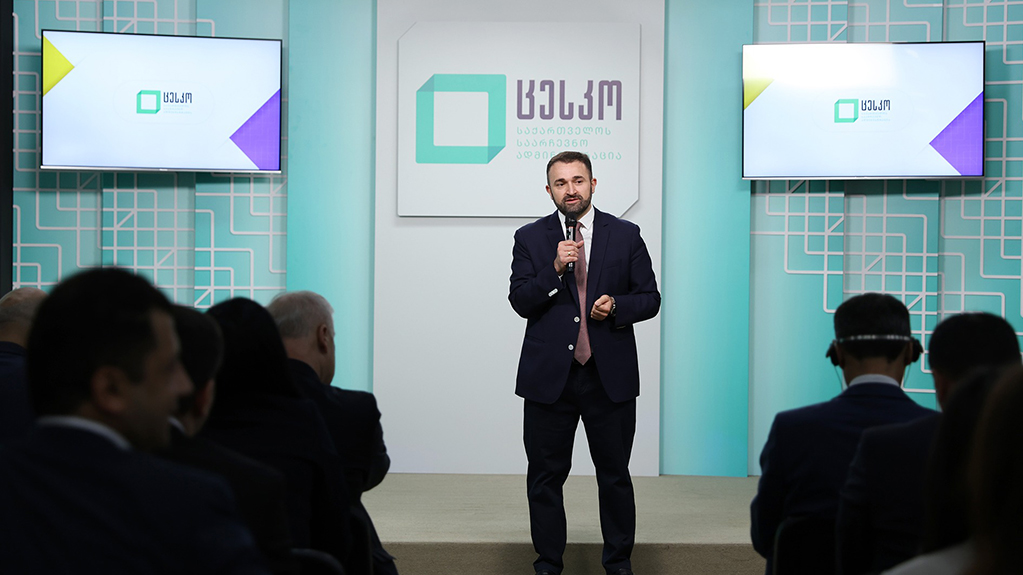The observation coalition My Vote demands that the heads of the Central Election Commission be held accountable and has appealed to the Prosecutor's Office to launch an investigation into the alleged official misconduct.
News
Coalition spokesperson Londa Toloraia spoke at a briefing today about the involvement of the election administration in the parliamentary election fraud scheme. She named CEC Chairman Giorgi Kalandarishvili, his deputy Giorgi Sharabidze, and CEC Secretary Giorgi Javakhishvili.
According to Toloraia, the CEC did not fulfill its promise that the quality of the ballots on elections day would ensure the secrecy of the vote and instead printed the ballots on thin paper. This allowed all individuals present at the electronic polling station to identify the choice made by the voter.
“The CEC’s decision and actions on Election Day allowed the ruling party to extensively control the will of voters, both by members of the election commission and through the use of video cameras installed at polling booths and vote-counting machines,” said Londa Toloraia.
According to her, the CEC illegally, arbitrarily, and without justification changed the rule established by the Election Code two months and nine days before the elections. Instead of determining the function of registrars by drawing lots on Election Day, it set the deadline for the drawing of lots to 1 week before the elections.
“As a result of this change, it became impossible for most observation organizations to monitor the process. Additionally, the CEC’s alteration of the procedure for appointing employees of the verification apparatus and determining their identities a week in advance simplified the process and enabled influence over those performing this function, aligning them with the interests of the ruling party.
This same decision by the CEC led to the assignment of these functions to the members of the precinct election commission, who were responsible for regulating the flow and marking procedures through a non-transparent process. The lack of compliance with the marking procedure on elections day significantly contributed to the successful implementation of the fraud scheme. It was precisely the failure to carry out the marking that allowed individuals to vote using someone else’s ID card and personal number.
Despite the CEC’s public promise that there would be no disruption to the verification process, the reality at polling stations on elections day was completely different. Registration tables at polling stations were affixed to the walls in such a way that it was impossible for observers to fully monitor the process,” Toloraia stated.
She noted that there is evidence that Georgian Dream had other individuals vote on behalf of those who were not in Georgia and/or at their registered addresses, which “is unthinkable without the participation of the election administration.”
“The CEC’s decision not to open additional polling stations abroad increased the number of citizens who were unable to participate in the elections. This decision facilitated the ruling party’s plan to have others vote instead of those who were not in Georgia and/or at their registered addresses.
On elections day, there were reports that voters were denied the opportunity to vote because they were allegedly on the list of mobile ballot boxes and had already cast their votes. As per information provided to the monitoring organization, representatives of the election administration visited voters at their homes, promising to include them on the mobile ballot box lists and to bring the mobile ballot box to their residences on elections day. However, they did not bring the mobile ballot box, thereby preventing them from voting. It is highly likely that others voted in their place.
In precincts established abroad, in several cities with a high number of emigrant voters, the voting process took place amidst faulty infrastructure and insufficient registrars, which jeopardized the entire election process. Many voters were unable to vote, and the health of voters, observers, and commission members was also at risk,” said Londa Toloraia.
The monitoring coalition also stated that the appointment of family members of Georgian Dream representatives and individuals associated with them as members and chairpersons of precinct election commissions was intended to implement a “large-scale fraud scheme.”
The coalition noted that the CEC had issued accreditation to Russian propaganda media outlets, including NTV-accredited Russian propagandist Alexander Malkevich, who violated Georgia’s law On Occupied Territories. Malkevich is wanted by U.S. authorities on charges of interfering in U.S. elections and has a $10 million reward for information leading to his capture. The CEC secretary is responsible for his accreditation.
According to My Vote, CEC Chairman Giorgi Kalandarishvili did not respond to reports of violations on elections day, nor did he call on commission members or relevant services to take action, which “raises reasonable doubt that the CEC accepted the events at the polling stations.”
“The ruling party changed the law to allow Giorgi Kalandarishvili to remain in the position of CEC Chairman, which has become a subject of criticism from international organizations. As it appears today, for the ruling party, Giorgi Kalandarishvili’s presence in this position was crucial for the party to pursue its interests during the election period. The analysis of video footage from the CEC sessions confirms that, along with CEC Chairman Giorgi Kalandarishvili, his deputy Giorgi Sharabidze and CEC Secretary Giorgi Javakhishvili were actively involved in making illegal decisions to facilitate the desired scheme,” Toloraia noted, adding that the individuals named are guilty of at least a crime under Article 342 of the Criminal Code, which implies official negligence. If intent is confirmed, abuse of official authority (Article 332) is also evident.
Additionally, the monitoring coalition stated that “conducting an effective investigation in conditions where all state institutions, including investigative services, are subordinate to the ruling party, is unrealistic at this stage.”















